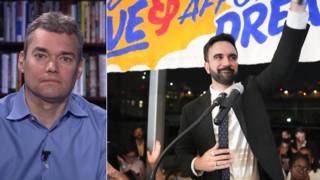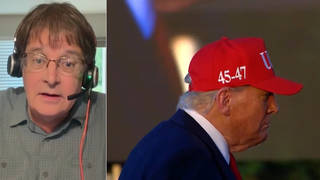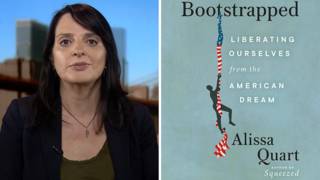
Guests
- Joseph StiglitzNobel Prize-winning economist and a professor at Columbia University. He is the author of numerous books. His most recent book is The Price of Inequality: How Today’s Divided Society Endangers Our Future.
In an extended interview about his new book, The Price of Inequality,
Nobel prize-winning economist Joseph Stiglitz offers several recommendations for a reform agenda. “Traditional economics said we could only get more equality if we pay a price. We have to weaken our economy in one way or another,” Stiglitz says. “But my book shows that that’s wrong, that we can have more equality, stronger economy, more growth, greater efficiency. There’s not a conflict; the two actually go together.” Click to see parts 1 and 2 of this interview.
AMY GOODMAN: This is Democracy Now!, democracynow.org, The War and Peace Report. I’m Amy Goodman, with Nermeen Shaikh. Our guest is Joseph Stiglitz, the Nobel Prize-winning economist, professor at Columbia University, author of a number of books. His latest is The Price of Inequality: How Today’s Divided Society Endangers Our Future.
NERMEEN SHAIKH: Joseph Stiglitz, you conclude your book, The Price of Inequality, with a series of recommendations to lessen inequality in the U.S. Can you outline what some of the most important ones are?
JOSEPH STIGLITZ: Well, they follow very closely from my diagnosis of what are the sources of inequality and what are the ways in which inequality is actually undermining, weakening our economy. So we’re paying a high price for this inequality. One of the real concerns I had was inequality of opportunity. And the major factor affecting equality of opportunity is public education. We have to support more public education. If you look at even our elite schools, which are the entry into the best jobs in the country, only 8 percent of the students in these elite colleges come from the bottom 50 percent of our country.
I explain how the laws and regulations that govern markets shape markets in a way that help the top and hurt the rest. So we need more—stronger competition laws. We need reformed bankruptcy law. We need to make sure our financial system works for most Americans. There are a whole set of—we need to reform corporate governance laws. So there’s a whole—every one of the economic laws has to be reformed.
One of the—I talk about how there’s—there is an economic reform agenda that could really make a difference. But the real problem is, can we get that through the politics? And there’s developed in the United States this vicious circle, because more inequality gives more political power to the top. They then pass laws that give more—lead to more economic inequality. So, we are going to have to have political reform to make democracy really work.
And you were talking earlier in the program about Citizens United. It’s gone exactly in the wrong way. We’ve moved from a democracy, which is supposed to be based on one person, one vote, to something much more akin to one dollar, one vote. When you have that kind of democracy, it’s not going to address the real needs of the 99 percent.
AMY GOODMAN: You’ve talked about a growing neofascism that we’re seeing in Europe, as inequality increases, austerity increases. Talk about there and then here at home.
JOSEPH STIGLITZ: What happens when democracy doesn’t work, there’s disillusionment. You can see one aspect of the disillusionment in the voter turnout in the United States, say in the election of 2010, when only 20 percent of the young people went out to vote. That was a statement that they were saying that it didn’t make any difference which party was going to win, money was going to win, whether it’s the Republican or Democratic Party. When people become disillusioned, they turn to extremes. And in Europe, they turn to the extremes of the neofascist parties. In the United States, they’re turning to something somewhat less extreme, which is the Tea Party movement. But that could easily evolve into a movement that is itself extreme, a movement with less compassion, a movement that blames others for the country’s woes.
AMY GOODMAN: And the Occupy movement, what direction do you think it should go in? What do you think are the pressure points, the most successful way to push forward the kind of agenda you’re talking about?
JOSEPH STIGLITZ: What I think about—what was very positive about the Occupy movement was that it said, “Look at, most of us are in the same boat.” You know, it’s not the rich versus the poor, it’s the 99 percent, which was saying, everybody. What they were really saying, we’re all in the same boat and that we therefore all have to look for policies that benefit the vast, overwhelming majority of Americans. That message, that we’re not about class divide, we’re about the country as a whole, that’s really what you say when you’re saying “the 99 percent.” I think if they keep up the message and say—you know, and this is what the book, The Price of Inequality —that divide that’s dividing our society is really weakening our society.
If there’s a single message of my book, it’s this: traditional economics said we could only get more equality if we pay a price. We have to, you know, weaken our economy in one way or another. But my book shows that that’s wrong, that we can have more equality, stronger economy, more growth, greater efficiency. There’s not a conflict; the two actually go together. And to me, that’s an important message that Occupy Wall Street ought to be conveying.
AMY GOODMAN: Joe Stiglitz, I want to thank you very much for being with us, Nobel Prize-winning economist, author of many books. The latest one is called The Price of Inequality: How Today’s Divided Society Endangers Our Future. This is Democracy Now!












Media Options